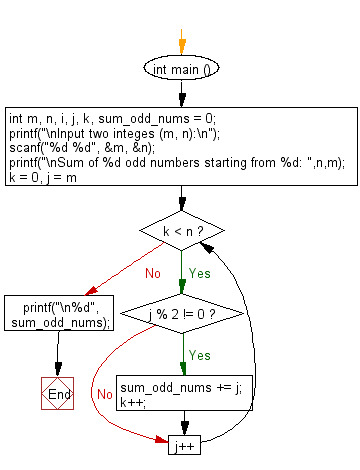C Exercises: Sum of n odd numbers starting from m
C Basic Declarations and Expressions: Exercise-123 with Solution
Write a C program that reads two integers m, n and compute the sum of n odd numbers starting from m.
Sample Solution:
C Code:
#include <stdio.h>
int main ()
{
int m, n, i, j, k, sum_odd_nums = 0;
printf("\nInput two integes (m, n):\n");
scanf("%d %d", &m, &n);
printf("\nSum of %d odd numbers starting from %d: ",n,m);
for (k = 0, j = m; k < n; j++)
{
if (j % 2 != 0)
{
sum_odd_nums += j;
k++;
}
}
printf("\n%d", sum_odd_nums);
}
Sample Output:
Input two integes (m, n): 65 5 Sum of 5 odd numbers starting from 65: 345
Flowchart:

C programming Code Editor:
Contribute your code and comments through Disqus.
Previous: Write a C program that reads two integers m, n and compute the sum of n even numbers starting from m.
Next: Write a C program that reads an array of integers (length 7), replace every negative or null element by 1 and print the array elements.
What is the difficulty level of this exercise?
Test your Programming skills with w3resource's quiz.
C Programming: Tips of the Day
Static variable inside of a function in C
The scope of variable is where the variable name can be seen. Here, x is visible only inside function foo().
The lifetime of a variable is the period over which it exists. If x were defined without the keyword static, the lifetime would be from the entry into foo() to the return from foo(); so it would be re-initialized to 5 on every call.
The keyword static acts to extend the lifetime of a variable to the lifetime of the programme; e.g. initialization occurs once and once only and then the variable retains its value - whatever it has come to be - over all future calls to foo().
Ref : https://bit.ly/3fOq7XP
- New Content published on w3resource:
- HTML-CSS Practical: Exercises, Practice, Solution
- Java Regular Expression: Exercises, Practice, Solution
- Scala Programming Exercises, Practice, Solution
- Python Itertools exercises
- Python Numpy exercises
- Python GeoPy Package exercises
- Python Pandas exercises
- Python nltk exercises
- Python BeautifulSoup exercises
- Form Template
- Composer - PHP Package Manager
- PHPUnit - PHP Testing
- Laravel - PHP Framework
- Angular - JavaScript Framework
- Vue - JavaScript Framework
- Jest - JavaScript Testing Framework
